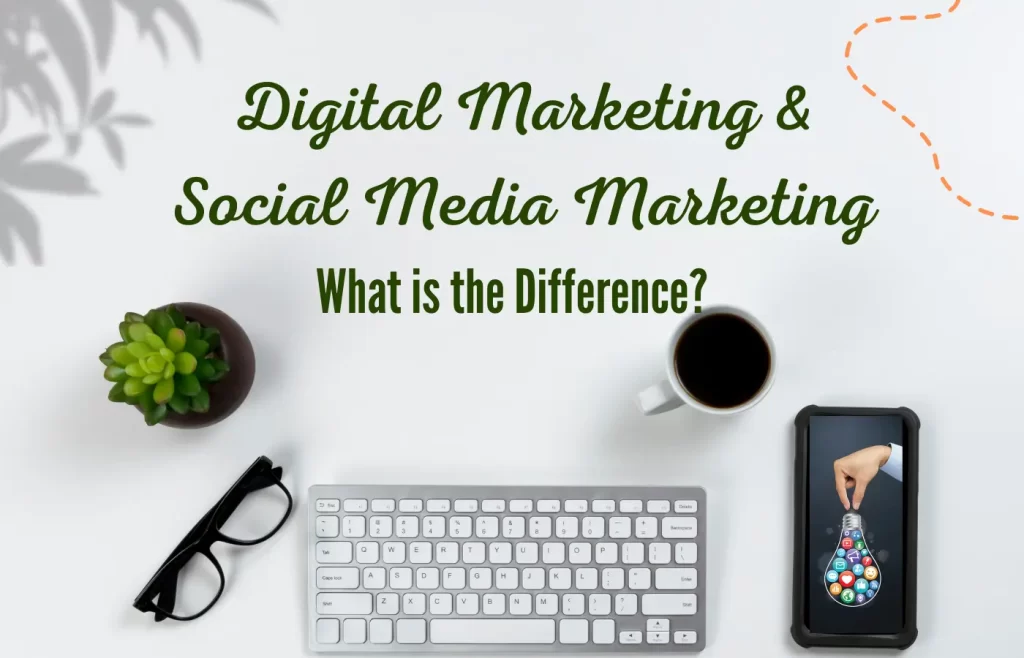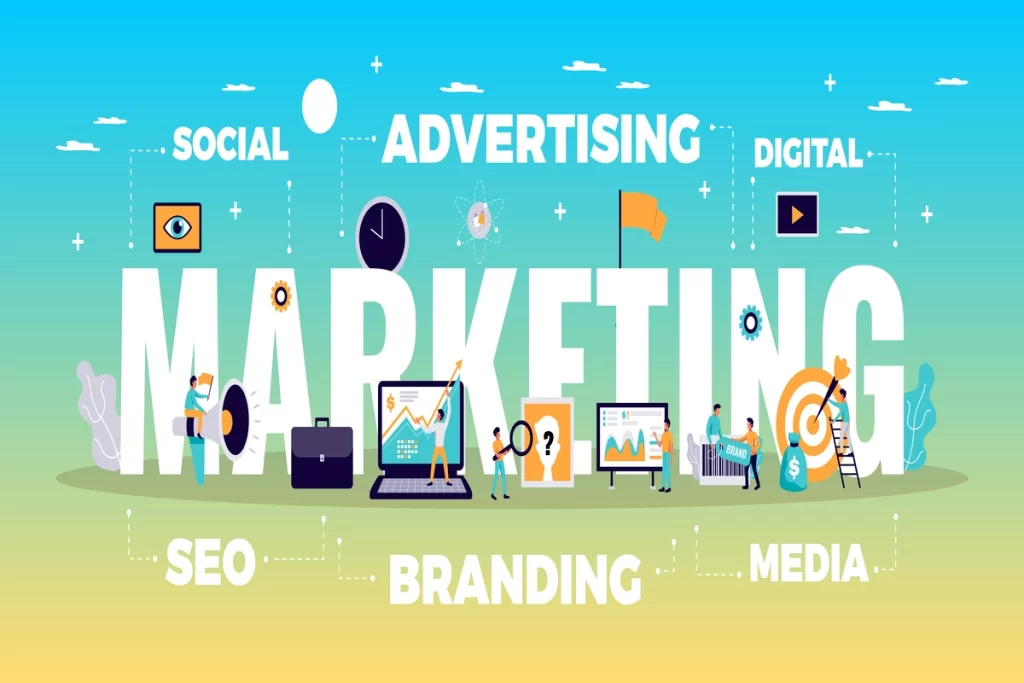In today’s digital age, businesses must understand the importance of digital marketing and social media marketing. Though what are the differences between the two?
Here at Manoz, we will explore the key differences between these. We will cover all the aspects of why marketing is important for any business.
Digital marketing is an umbrella term for all online marketing efforts, including content creation, SEO, email marketing, and all other marketing activities.
While social media marketing is part of digital marketing that focuses on social media platforms. Like Facebook, Instagram, Snapchat, Twitter, LinkedIn, and other social platforms.
To Achieve One Desired Objective, Explain How Digital Marketing Works.
As digital marketing is a technical field, one tactic might only work for some businesses. Businesses achieve goals by joining the basics of digital marketing and various tactics. And can get desired goals.
One of the most popular methods for reaching customers online is social media like Facebook, Twitter, Linkedin, etc.
But digital marketing continues beyond social media. Email campaigns are still important to any successful strategy. You can drive conversions higher than before. Need only crafting effective emails to capture customer attention.
Additionally, paid search (PPC) advertising is one of the most effective ways businesses can reach new customers online.
You can improve your chances of converting traffic into leads or sales by using SEO and targeting your ads at a specific audience.
Understanding digital marketing trends is essential for businesses when you’re looking to improve your online presence.
We generally mix digital tools to reach one of the following goals. And to know that digital marketing performs well in achieving desired business goals.
- Create brand awareness first and then develop a customized relationship.
- Growing sales and profit
- Put in place inbound marketing to add value and seek out customer behavior for one popular brand.
- Promote a product or brand through social channels.
- Use paid ads (PPC, CPC).
- And much more.
Get ready yourself for desired or sometimes undesired results. As start-ups, they may need help to improve which platform works better for their needs.
Put in place all different strategies, test them again, and measure ROI and growth rate. Then, as a new power emerges; discard the channels that aren’t working well. Work until you achieve satisfactory results.
By developing a well-rounded strategy that takes advantage of all available toolkits. You’ll be on your way toward success!
Exploring Social Media Marketing
It is the function of the marketing subspace known as “Social Media Marketing.”
Understanding the importance of social media marketing in digital marketing is crucial if you want to succeed in today’s business world.
With social media platforms, businesses can boost engagement by using content relevant to their target audience and engaging with their customers personally.
There is a lot of value in investing in a social media strategy.
Social media marketing provides value to any business, so take advantage of it.
But Why?
Many people rely on social media as part of their daily lives. It is a great way to connect with friends and family and stay up-to-date on the latest news and events in business.
Because so many people use social media these days, it makes sense for businesses of all sizes to leverage it.
There are two main types of social media: organic (where content is shared with users organically) and paid (where content is shared with users who compete to do so).
Paid platforms like Facebook offer more opportunities for businesses than organic platforms like Twitter because paid posts tend not to be filtered out by Twitter’s algorithms (meaning they will appear in more people’s timelines).
However, there are several important factors that businesses should consider. It must focus on that before deciding whether paid or organic promotion is best for them.
Such as brand awareness, engagement rates, likes, shares, and commenting habits.
When designing a social media strategy for your business, it is important to identify who will be responsible for producing content across all channels, including your website, blogger outreach, social networks, etc.
Usually, this falls into one departmental area, such as PR, marketing communications, etc.
Then, planning a content calendar with due dates, followed by an editorial review, will ensure consistency across channels.
So,
How to Leverage Digital Tools and Strategies for Digital Marketing and Social Media Marketing
Digital marketing is the perfect way to reach more targeted and engaged audiences on social media. With digital tools and strategies, you can create engaging content, track customer engagement and behavior, measure results, and optimize your website for better search engine visibility.
Some essential digital marketing tools and strategies you’ll need for social media success are: Keep it up to learn more!
Digital Marketing Tools:
- Email marketing
- CRM (customer service tools)
- Content creation tools
- AI Marketing Tools
- SEO tools
- Affiliate marketing
- Social media marketing (paid or organic)
- Display retargeting
- Website analytics
- Content creation
All these and much more are digital marketing tools that strategies define.
Creating engaging content is the key to social media marketing success. No matter what social media platform you use—Facebook, Twitter, LinkedIn, or Instagram—your content must be top-notch for your campaigns to succeed.
Creating great, informative, and engaging content will reach a wider audience than ever. You can read about digital marketing and content writing here and how effective writing can help in digital marketing.
In addition to having great writing skills, it’s also important to have a sense of humor when creating social media content. Use the content curation method instead. After all, people spend more time on social media than ever and want quality entertainment.
Target The Audience
Another important factor in social media marketing is targeting your audience. You can target specific demographics with highly relevant ads using digital tools like Google AdWords or Facebook Ads Manager.
It allows you to reach a much wider audience without wasting valuable resources. Plus, by knowing exactly who your customers are (and what interests them), you can craft your advertising campaigns accordingly!
Organic Reach Has the Potential to Increase Your Visibility
Digital marketing can also increase organic reach thanks to online search engines like Google and Bing.
Optimizing your website for better search engine visibility (through keyword research) can increase the chances that people will stumble upon your site organically instead of driving with an ad campaign.
In addition to increasing website traffic from organic sources, digital marketing can help drive leads through email campaigns or even social media ads that link directly to your website or blog posts.
Unlimited Forums
Digital marketing is wider than traditional forms of communication. With today’s technology capabilities, including video and image editing software, businesses can create and share great visual content on social media platforms.
It allows businesses with a visual presence on social media to share their stories interestingly. It can also help build relationships based on trust with potential customers and influencers quickly and effortlessly.
Selecting Between the Two
Businesses can use two main types of marketing: digital marketing and social media marketing. Both have their own set of advantages and disadvantages, but which one is right for your business?
Here, we’ll outline the key differences between the two and help you decide which is best for your business.
First off, what differentiates digital marketing from social media marketing? Digital marketing uses technology to reach and engage customers via online channels like websites, email campaigns, or even advertising.
Again, social media marketing uses social media platforms. Such as Facebook, Twitter, and LinkedIn to connect with customers and build relationships.
With that out of the way, let’s look at some of the advantages and disadvantages of each type of marketing. Digital marketing has several advantages over social media marketing:
It can be more cost-effective because digital channels need less infrastructure (such as staff) than social media platforms.
Digital channels are more targetable than social media channels because they are designed to reach people online.
Digital campaigns can be more targeted because they can include specific keywords or phrases that will bring in targeted traffic from Google AdWords or other ad networks.
Finally, digital campaigns are more effective than social media campaigns. Because they have a greater reach, they can reach a larger audience than traditional social media platforms such as Facebook or Twitter.
Conclusion Digital Marketing and Social Media Marketing
To sum up, digital and social media marketing are essential tools for businesses looking to reach their target audience most effectively.
Digital marketing offers cost-effective methods such as email campaigns, pay-per-click (PPC) advertising, and search engine optimization (SEO) optimization.
At the same time, social media allows businesses to interact with customers on a more personal level. You can create engaging content and track customer behavior by leveraging digital tools. And by effective digital strategies.
FAQs
Do Social Media trends remain the same?
Here is one thing you must understand the trend of social media marketing always remains the same. Yet, it has become a crucial need in this digital era.
What is the purpose of digital marketing?
The main purpose of digital marketing is to encourage digital communication channels to cover the gap—the gap between the customer and business.
Can digital marketing be equated with social media marketing?
It’s different as digital media marketing are online and offline activities used to reach a larger audience. But social media marketing is restricted to only online platforms (social platforms).


